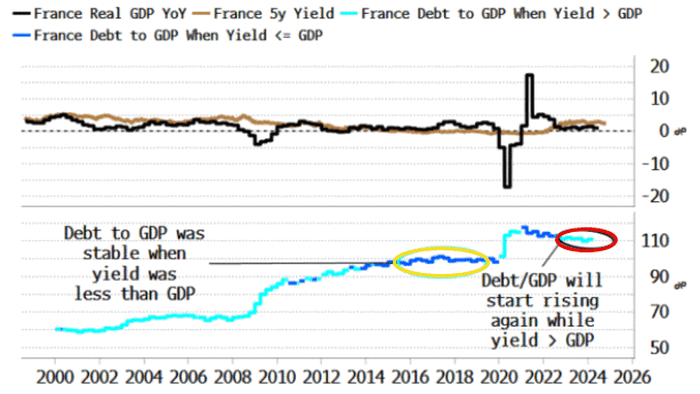France is currently facing a critical economic challenge as it strives to reduce its budget deficit while maintaining growth to prevent an escalating debt-to-GDP ratio. This situation necessitates a delicate balance; the French government must implement measures to cut the deficit while ensuring that these measures do not significantly hinder economic growth. The recent announcement of the budget for the coming year reflects these priorities, aiming to achieve savings of over €60 billion. The government anticipates that these savings will reduce the budget deficit from 5.5% to 5% of GDP, marking a strategic step toward addressing France’s fiscal challenges.
The government’s decision to target a budget deficit of 5% reflects a commitment to fiscal responsibility amidst concerns about rising public debt. France’s debt-to-GDP ratio has been a point of concern for economists and policymakers alike, as high levels of debt can lead to reduced investor confidence and increased borrowing costs. Thus, the government recognizes the urgency of enacting measures that will not only lower the deficit but also foster a stable economic environment conducive to growth.
The projected savings of €60 billion will likely involve a combination of expenditure cuts and revenue-enhancing policies. While specific details of the budget measures were not disclosed, the government emphasized the importance of not compromising public services or investment in key sectors. Consequently, it will be essential to create a budget that emphasizes efficiency and prioritizes investments that can yield long-term growth, such as infrastructure and innovation.
In pursuit of these fiscal goals, the government must also remain attentive to public sentiment and potential backlash against austerity measures. History has shown that aggressive budget cuts can lead to social unrest, and with France’s rich tradition of public demonstrations, any moves perceived as excessively harsh could provoke significant opposition. Thus, implementing reforms in a manner that minimizes disruption to the average citizen while encouraging economic activity is crucial.
Moreover, the global economic landscape presents additional challenges for France as it navigates these reforms. Factors such as inflation, geopolitical tensions, and shifts in international trade dynamics can all impact domestic economic performance. The government must be agile in adapting its economic policies to mitigate any adverse effects stemming from these external influences while still aiming for the targeted budget deficit reductions.
In conclusion, as France endeavors to balance budget deficit reduction with economic growth, the upcoming budget represents a pivotal moment for the government. The goal of achieving a 5% deficit by implementing €60 billion in savings is ambitious but necessary. It requires careful planning and execution to ensure that the measures taken do not stifle economic recovery or provoke public unrest. The success of these initiatives will ultimately depend on the government’s ability to foster a resilient and responsive economic environment that can support sustainable growth while addressing fiscal sustainability.

